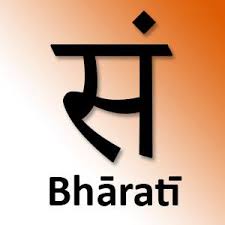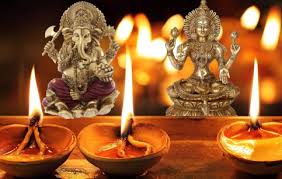





Literature
The word ‘Stuti’ in Samskrit means praise, glorification. They are poetic hyms in adoration of the Divine. We need an ideal to move towards. What we focus on we become that. When we constantly focus on the higher superior qualities of a higher soul or a deity we start operating in those qualities. In time we become that. Stuti is a way to do it. It contains verses that praise the capabilities and achievements of the Divine reminding us of our true potential and abilities. It invokes that part of our personality, which is truly us but lying dormant under the hustle and bustle of everyday life. By regular chanting or singing of the stutis, these words appeal to the higher, diviner, subtler parts of our subconscious personality and are slowly invoked and brought up to our conscious attention and reinforced in the mind. Stutis are, thus, powerful tools. Some of the most popular Stutis are : ~ DURGA STUTI - Recited by Arjuna, just as the battle at Kurukshetra was about to commence in Mahabharata ivoking fearlessness. ~ BHISHM STUTI – Recited by Bhishma Pitamah as he lay on the bed of arrows in Kurukshetra for Sri Krishna when he comes to visit him before Bhishma leaves his mortal body. ~ DHRUVA STUTI – Recited by 5 year old Dhruva in the 4th skanda of Srimad Bhagavatam in the presence of Lord Vishnu who not only appeared before him in recognition of his severe penance but also sparked him on to speak by touching his right cheek with His divine Conch, the Conch which overflows with Vedic wisdom.
~ KUNTI STUTI – Recited by Kunti (mother of the Pandavas) in the 1st canto of Srimad Bhagavatam expressing her gratitude for Sri Krishna BHISHM STUTI (श्रीमद्भागवते महापुराणे पारमहंस्यां संहितायां प्रथम स्कन्धे युधिष्ठिरराज्यप्रलम्भः नाम नवमोऽध्यायः ॥) श्री भीष्म उवाच - इति मतिरुपकल्पिता वितृष्णा भगवति सात्वत पुङ्गवे विभूम्नि । स्वसुखमुपगते क्वचिद्विहर्तुं प्रकृतिमुपेयुषि यद्भवप्रवाहः ॥ ३२॥ त्रिभुवनकमनं तमालवर्णं रविकरगौरवराम्बरं दधाने । वपुरलककुलावृताननाब्जं विजयसखे रतिरस्तु मेऽनवद्या ॥ ३३॥ युधि तुरगरजोविधूम्रविष्वक्कचलुलितश्रमवार्यलंकृतास्ये । मम निशितशरैर्विभिद्यमानत्वचि विलसत्कवचेऽस्तु कृष्ण आत्मा ॥ ३४॥ सपदि सखिवचो निशम्य मध्ये निजपरयोर्बलयो रथं निवेश्य । स्थितवति परसैनिकायुरक्ष्णा हृतवति पार्थ सखे रतिर्ममास्तु ॥ ३५॥ व्यवहित पृथनामुखं निरीक्ष्य स्वजनवधाद्विमुखस्य दोषबुद्ध्या। कुमतिमहरदात्मविद्यया यश्चरणरतिः परमस्य तस्य मेऽस्तु ॥ ३६॥ स्वनिगममपहाय मत्प्रतिज्ञा मृतमधिकर्तुमवप्लुतो रथस्थः । धृतरथचरणोऽभ्ययाच्चलत्गुः हरिरिव हन्तुमिभं गतोत्तरीयः ॥ ३७॥ शितविशिखहतोविशीर्णदंशः क्षतजपरिप्लुत आततायिनो मे । प्रसभमभिससार मद्वधार्थं स भवतु मे भगवान् गतिर्मुकुन्दः ॥ ३८॥ विजयरथकुटुम्ब आत्ततोत्रे धृतहयरश्मिनि तच्छ्रियेक्षणीये। भगवति रतिरस्तु मे मुमूर्षोः यमिह निरीक्ष्य हताः गताः सरूपम् ॥ ३९॥ ललित गति विलास वल्गुहास प्रणय निरीक्षण कल्पितोरुमानाः । कृतमनुकृतवत्य उन्मदान्धाः प्रकृतिमगन् किल यस्य गोपवध्वः ॥ ४०॥ मुनिगणनृपवर्यसंकुलेऽन्तः सदसि युधिष्ठिरराजसूय एषाम् । अर्हणमुपपेद ईक्षणीयो मम दृशि गोचर एष आविरात्मा ॥ ४१॥ तमिममहमजं शरीरभाजां हृदिहृदि धिष्टितमात्मकल्पितानाम् । प्रतिदृशमिव नैकधाऽर्कमेकं समधिगतोऽस्मि विधूतभेदमोहः ॥ ४२॥ श्री सूत उवाच - कृष्ण एवं भगवति मनोवाग्दृष्टिवृत्तिभिः । आत्मन्यात्मानमावेश्य सोऽन्तः श्वासमुपारमत् ॥ ४३॥ ॥ इति॥ +++++++++++++++++++++++++++++
Learn MoreContact
Magnam dolores commodi suscipit. Necessitatibus eius consequatur ex aliquid fuga eum quidem. Sit sint consectetur velit. Quisquam quos quisquam cupiditate. Et nemo qui impedit suscipit alias ea. Quia fugiat sit in iste officiis commodi quidem hic quas.
Location:
111/47,USRA,Vellayambalam,Trivandrum 695010,Kerala
Email:
namaste@templeofinnerwisdom.org
Contact:
9388818811
